 Petzlover
Petzlover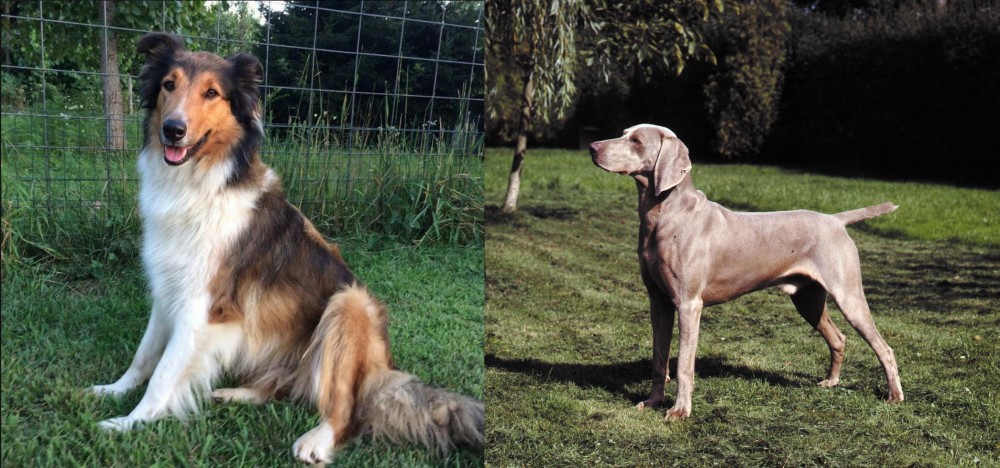 Scotch Collie is originated from United Kingdom but Smooth Haired Weimaraner is originated from Germany. Scotch Collie may grow 9 cm / 3 inches shorter than Smooth Haired Weimaraner. Scotch Collie may weigh 8 kg / 17 pounds lesser than Smooth Haired Weimaraner. Both Scotch Collie and Smooth Haired Weimaraner has almost same life span. Both Scotch Collie and Smooth Haired Weimaraner has same litter size. Scotch Collie requires Moderate Maintenance. But Smooth Haired Weimaraner requires Low Maintenance
Scotch Collie is originated from United Kingdom but Smooth Haired Weimaraner is originated from Germany. Scotch Collie may grow 9 cm / 3 inches shorter than Smooth Haired Weimaraner. Scotch Collie may weigh 8 kg / 17 pounds lesser than Smooth Haired Weimaraner. Both Scotch Collie and Smooth Haired Weimaraner has almost same life span. Both Scotch Collie and Smooth Haired Weimaraner has same litter size. Scotch Collie requires Moderate Maintenance. But Smooth Haired Weimaraner requires Low Maintenance
 The landrace breed, which started in the highlands of Scotland is known as the Scotch Collie. There were at the time two types of collies – the Rough or long haired collie and the smooth or short haired collie. The Scotch Collie is considered to be from a line of very ancient herding dogs. It might have existed in the days of the Roman Empire, these herding dogs might have included the Native Celtic Dogs, Roman Cattle Dogs, Gordon Setter, Viking Herding Spitzes and Irish Setters.
The landrace breed, which started in the highlands of Scotland is known as the Scotch Collie. There were at the time two types of collies – the Rough or long haired collie and the smooth or short haired collie. The Scotch Collie is considered to be from a line of very ancient herding dogs. It might have existed in the days of the Roman Empire, these herding dogs might have included the Native Celtic Dogs, Roman Cattle Dogs, Gordon Setter, Viking Herding Spitzes and Irish Setters.
In its native land the Scotch Collie is often called the colley dogs, coaly and cooley. Collie comes from the Scottish words for black coal – or the Coaley Sheep they herded. In addition to herding, the Scotch Collie also acted as a hunter and guard dog for its family. A large group of these collies were exported to America to work on family farms. Soon they were so popular they became family pets. They were first shown in both England and America in in the mid to late 1800’s.
The Scotch Collie Club was formed in 1885 and the breed accepted into the AKC the same year. The Collie Club of America started the following year. The AKC eventually dropped the moniker Scotch in favor or Rough and Smooth Collie. This move also separated the show dogs from the still working/herding Scotch Collies.
Aa time went on and the collie became more prominent in conformation competitions, some breeders mixed in the Greyhound and perhaps the Borzoi to get the collie we see today. The Scotch Collie itself eventually lost its independent recognition in the UKC and the NKC. It was mixed in with the English Shepard, but it was an important element in the development of the Australian Shepard, Shetland Sheepdogs and Border Collies.
The breed had a revival of sorts in the early 2000’s as the Old Time Scotch Collie. Any type of farm collie in America and Canada can be registered in the OTSCA. They are more often referred to as Old Time Farm Shepherds to avoid confusion them with the very popular collies. In 2017 there were 174 of these OTSCA dogs. Collies today have less working instincts, and the heeling instinct seems to be gone.
Today the show version of the Scotch Collie is recognized by both the AKC and UKC in the herding group.
It has been said of the Scotch Collie that they have “the majesty of a lion, the pride of a great thoroughbred stallion, the confidence of a Winston Churchill.”
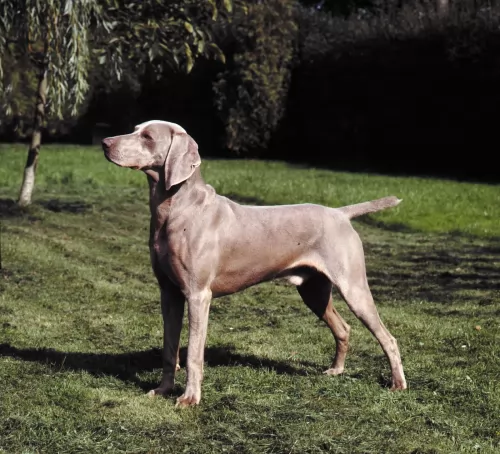 The Smooth Haired Weimaraner is a beautiful silvery-grey dog that was once bred for hunting way back in the 19th century.
The Smooth Haired Weimaraner is a beautiful silvery-grey dog that was once bred for hunting way back in the 19th century.
He has always been described as an all-purpose gun dog bred from crossing different German and French hunting dogs with the Bloodhound.
History of this dog dates back to 1897. This is when a club was formed in Germany for the breed.
 This Scotch Collie is an athletic, intelligent, well-balanced and alert dog. This collie has no exaggerated features like the long nose/muzzle of the current collies. This Scotch Collie is sound in mind and body, a hard working dog. He is hearty and versatile. They are longer than they are tall. Their heads are moderate and the stoop is well defined. They have a wide, flat skull. Their lips are tight and they are fitted well.
This Scotch Collie is an athletic, intelligent, well-balanced and alert dog. This collie has no exaggerated features like the long nose/muzzle of the current collies. This Scotch Collie is sound in mind and body, a hard working dog. He is hearty and versatile. They are longer than they are tall. Their heads are moderate and the stoop is well defined. They have a wide, flat skull. Their lips are tight and they are fitted well.
Their ears are also moderate in size and pointed or partially erect. They should not have long or droopy ears. They have eyes that might be oblique, almond, and round. The eyes are usually brown and merles may have blue eyes. The breed has a deep chest, broad shoulders and a long tail. There are also some bobtails that occur naturally.
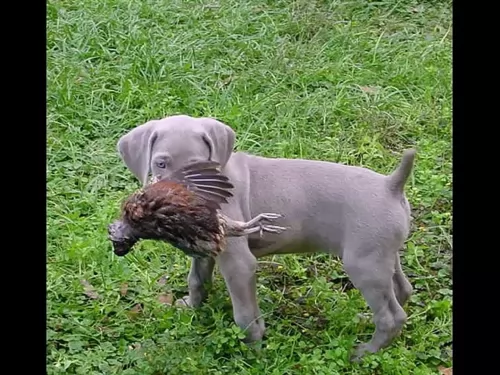 The lean, well muscled Smooth Haired Weimaraner is athletic to look at, brimming with energy and vitality. The coat is smooth and short and is a magnificent steel grey to silver coat which even tends to be a blue-grey color.
The lean, well muscled Smooth Haired Weimaraner is athletic to look at, brimming with energy and vitality. The coat is smooth and short and is a magnificent steel grey to silver coat which even tends to be a blue-grey color.
The short coat makes the dog low maintenance. He is also a low shedding dog. He is a medium to large sized dog standing at between 57 and 70cm in height and weighing in the region of 25 to 40kg.
The tail has always been docked, giving him that distinctive, dignified appearance. The tail then measures about 6 inches in length.
These dogs are also excellent water dogs with their webbed paws. The ears of the dog are medium length and floppy and the eyes are light amber or a blue-grey color.
You just have to look at the Smooth Haired Weimaraner and you can see how he just loves being with his human owner all the time, so much so that he is known for separation anxiety. Sometimes he can become so distraught separated from his owner that he can even injure himself trying to reach his owner. Being separated for too long can cause him anxiety issues.
Certainly this dog is going to need the right kind of training and socialization to calm him. They’re also full of energy too and are going to require a good amount of exercise.
 3.Adaptability - Scotch Collies are versatile and adaptable. There is no need to crate them as they are not destructive. If you have a large run or kennel, they can live anywhere. However they are happiest on farms and open lands.
3.Adaptability - Scotch Collies are versatile and adaptable. There is no need to crate them as they are not destructive. If you have a large run or kennel, they can live anywhere. However they are happiest on farms and open lands.
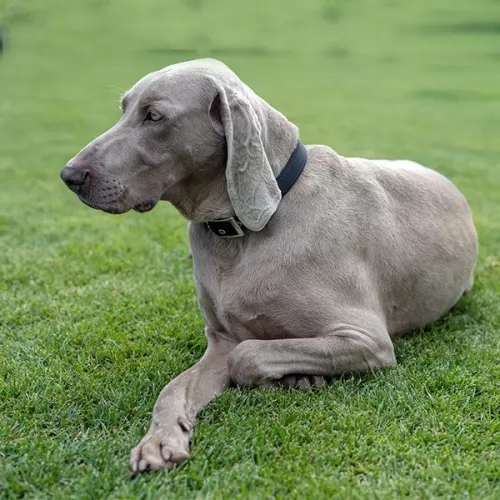 Your distinctive silvery-grey Weimaraner with his velvety ears and striking eyes is such a loving dog, desiring to be with his human family as much as possible.
Your distinctive silvery-grey Weimaraner with his velvety ears and striking eyes is such a loving dog, desiring to be with his human family as much as possible.
They are also good with children. Their loving nature and eagerness to please will ensure that you have a fully integrated 4 legged family member in your home who wants to be involved with everything you're busy with.
 The old line breed was hearty with few health issues. The ones they did have included:
The old line breed was hearty with few health issues. The ones they did have included:
• Skin problems - can have skin diseases like mange that may or may not be acute, may have allergies or sensitivities.
 There are some common dog illnesses that most dog owners fear, and hip dysplasia is one. Fortunately the Orthopedic Foundation for Animals tells us that Weimaraners aren’t prone to this dysplasia the way some dogs are.
There are some common dog illnesses that most dog owners fear, and hip dysplasia is one. Fortunately the Orthopedic Foundation for Animals tells us that Weimaraners aren’t prone to this dysplasia the way some dogs are.
One cause for concern however is bloat, and as a deep chested dog breed, the Short Haired Weimaraner can be prone to this life threatening illness.
Known also as gastric torsion, the stomach swells up and the dog becomes lethargic and restless. Immediate veterinary intervention is required. One way to diminish your dog’s chances of getting bloat is to rather feed him two smaller meals a day as opposed to one large meal.
Also, skin allergies are fairly common with these dogs. If redness appears on the skin or the skin is dry and itchy with a rash and he is losing his hair, you may well need to get your pet to the vet. It is why we always recommend giving your pet some raw meat added to the diet and this can help to prevent skin allergies.
 1Feeding the puppy - The Scotch Collie is not a medium dog nor is it a large dog. It is somewhere in-between. Because of this there is some discretion in not only how much you feed your puppy, but also what you feed. Normally we would feed according to breed size but here you need a high quality formula that is made for working breeds. The puppy will need enough calories to meet their high energy needs. Feed at least 3-4 times a day.
1Feeding the puppy - The Scotch Collie is not a medium dog nor is it a large dog. It is somewhere in-between. Because of this there is some discretion in not only how much you feed your puppy, but also what you feed. Normally we would feed according to breed size but here you need a high quality formula that is made for working breeds. The puppy will need enough calories to meet their high energy needs. Feed at least 3-4 times a day.
2.Feeding the adult - you need a high quality formula that is made for working breeds. The adult will need enough calories to meet their high energy needs. Feed at least 2 times a day.
There is a high need for exercise starting with walks or jog but that is not going to be enough. The Scotch Collie is not a Border Collie or a Corgi in terms of energy, but they are not couch potaoes. They need more than access to a yard. They need a job or they need defined exercise and play. The daily walk or jog will do it but intense play is better.
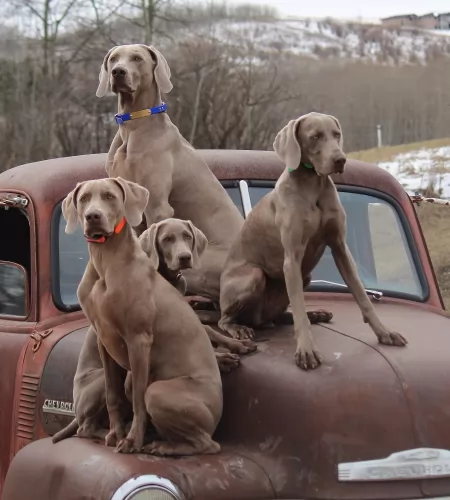 Every dog, especially the Smooth Haired Weimaraner with his anxiety issues, should be trained and socialized, and these dogs are easy to train because they’re intelligent and they want to please.
Every dog, especially the Smooth Haired Weimaraner with his anxiety issues, should be trained and socialized, and these dogs are easy to train because they’re intelligent and they want to please.
The short silvery coat simply requires a good brush-down twice a week to remove the few loose hairs there are. Even if you don’t need to brush him, just do it because of the type of dog the Weimaraner is.
He loves the closeness of owner and dog. It’s a good time to check him over for ticks and fleas, to feel for unusual lumps, to look inside his ears for signs of infection, to check his eyes too, that they’re bright and clear.
If you feed your Smooth Haired Weimaraner commercially manufactured dog food, it needs to be one of the best ones with fairly high protein content. If feeding kibble, you can enhance the food by adding in some tasty home-made food. The Weimaraner’s stomach is easily upset so you want to add in easily digestible home-made food free of exotic spices and richness.
Boiled chicken, brown rice or pasta and spinach, sweet potatoes and carrots is super tasty and nutritious. Your Weimaraner will love such simple, good food and you can add a little to his dry kibble twice a week.
Also important is to add in some raw meat as this ensures a healthy skin. Make sure he has a constant supply of cool, fresh water.